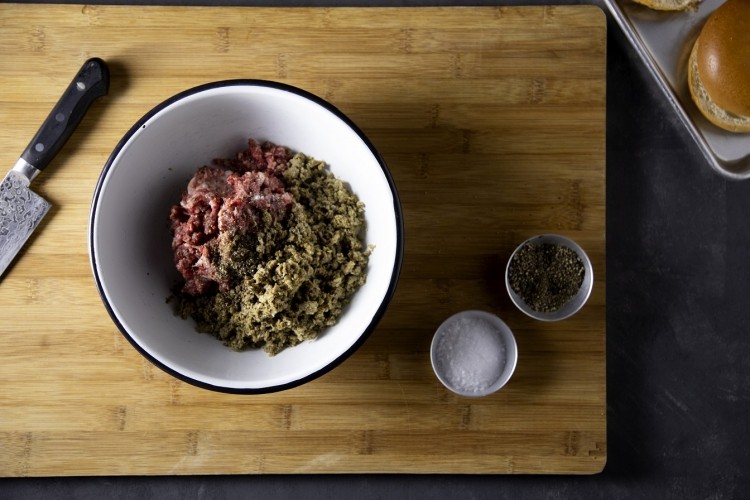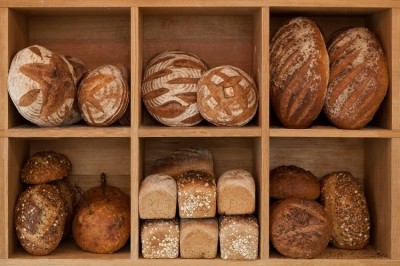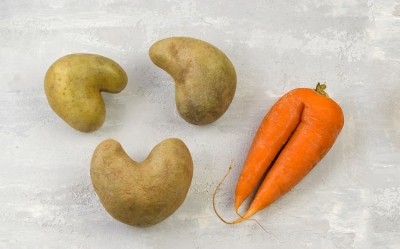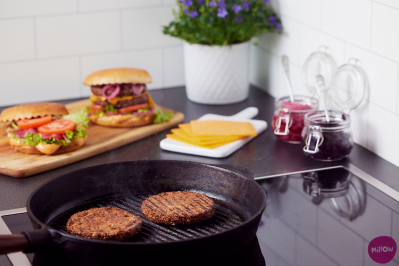Upcycling food waste to grow ‘highly nutritious’ mycelium protein

A portfolio company of the Strauss Group Kitchen FoodTech Hub, Mush Foods has announced it has successfully developed its mycelium protein ingredient solution, called 50CUT, to slash the animal protein content in meat products by 50%. Mushroom-derived 50CUT delivers a ‘beefy bite’ of nutrient-dense protein to meat hybrid formulations that appeal to even the most devoted meat lovers, the company claimed.
“Our mushroom-derived products address the reality that there is a sizeable population of carnivores who are simply not willing to compromise on beef’s rich taste, nutritional boost, and textural experience,” said Shalom Daniel, co-founder and CEO of Mush Foods. “50CUT is tailored specifically for hybrid meat products to satisfy flexitarians and carnivores with the unique sensation they crave, while easing the impact of global meat consumption.”
A blend of three edible mushroom mycelium species
The product is made up of three edible mushroom mycelium species. “By combining different types of mycelium we can create a unique ingredient which perfectly pairs with the particular taste, formability, texture, aroma, and even colour of beef,” said Dan Levanon, PhD, co-founder and Chief Scientific Officer of Mush Foods. “Once you add 50CUT to ground beef, it acts like a sponge and absorbs all the water, juiciness, fat, aromatic compounds, and assumes the visual appearance of the beef. From the full organoleptic and nutritional perspectives, 50CUT functions as the perfect complement to beef, enhancing its taste.”
The mycelium network is a thread-like, root-like underground system of fungi. It breaks down forest plant matter, effectively nourishing the mushrooms growing above ground as well as the surrounding ecosystem. Mush Foods’ proprietary technology for upcycling food side streams from local manufacturers was initially developed at the MIGAL Galilee Research Institute in Israel.
“We grow the mycelium above the ground in indoor farms using a highly efficient method,” explained Idan Pereman, PhD, co-founder and Mycology Director for Mush Foods. “Our fermentation platform recreates the underground growth conditions, without light and uses minimal land, energy, and water. After harvesting, we produce the mycelium in a 100% natural process, with gentle preparing and shaping, reducing liquid to create a final product which contains no additional ingredients, binders, additives or flavourings.”
Why hybrid?
Hybrid combinations of meat and plant proteins can help combat the formulation challenges currently facing the plant-based sector.
Despite new product development and heavy promotions from retailers, taste and price of meat-free products are still the major barriers for shoppers.
“There are several challenges that are holding back the wide adoption of foods which are 100% plant-based, keeping its market share at unsatisfying levels,” said Amir Zaidman, Chief Business Officer of The Kitchen FoodTech Hub. Mush Foods solution tackles these challenges and has the potential of widespread adoption, he insisted. “Having a million people cutting their meat consumption by 50% is a lot more likely to make an impact than one hundred thousand giving up on meat altogether. For this reason, we are sure Mush Foods will be a gamechanger.”
Mycelium can further claim nutritional credentials. It is a whole protein, housing all the essential amino acids. It is rich in fibre and vitamins and contains no saturated fat, no cholesterol, and acts as a natural binder. Unlike other alternative proteins, mycelium possesses a natural umami flavour similar to meat, eliminating the need for masking agents or added flavours.
Mush Foods stressed that it boosts the flavour of the meat product, while contributing to the meat-like texture and aroma. In formulations, the mycelium fibres maintain the volume of the ground meat matrix by absorbing the meat juices, further preserving flavour and making the addition of fillers such as texturized proteins unnecessary.
Circular economy
Mush Foods' mycelium ingredient requires no agricultural land and uses minimal energy and water. Cultivation does not depend on season or climate. “Our mycelium ingredient is grown from food waste, making it highly sustainable and exerting a minimum carbon footprint,” added Daniel. “It also grows exceptionally fast: While it takes a year to grow a cow, and four months to grow soy, it takes only eight-ten days to grow mycelium, making it a highly scalable—and affordable—option.”
Mush Foods mixes several types of food waste, it explained to FoodNavigator, tailoring ingredients to create the optimal medium suited for each different mycelium strain. The main ingredients are sidestreams from coffee, beer, soy, and corn production. The patent-pending substrate is the result of more than 15 years of research on the part of Mush Foods co-founder Prof. Dan Levanon of Migal – Galilee Research Institute.
But might end consumers be put off by the fact the mycelium ingredient is grown from food waste? Consumers can be "reassured that Mush Foods’ unique formulations consisting of upcycled ingredients yield clean and safe substrates, free of animal waste and manure which is all too often present in other agricultural industries," we were told.
In a November 2022 pilot study of 4,000 participating employees drawn from various financial institutions in New York, Mush Foods’ 50CUT hybrid beef and mycelium burger scored the highest out of 11 main dish options.
“The encouraging results reflect a consumer demand for this kind of alternative,” said Daniel. “To make a true impact, the product must benefit consumers and food companies as well as restaurateurs. All are attuned to evolving food trends and do not want to compromise when seeking quality alternatives that are affordable, nutritious, tasty, and kind to the planet, Mush Foods ticks all the right boxes.”
Mush Foods’ GTM strategy is to initially penetrate US foodservice, followed by expansion into Europe, with retail planned for a later stage. The 50CUT items are the first product line, and "new exciting categories" are in the works.















